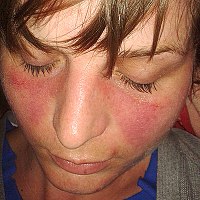
Photo from wikipedia
Autoinflammatory diseases (AIDs) are disorders characterised by recurrent inflammatory episodes in charge of different organs with no apparent involvement of autoantibodies or antigen-specific T lymphocytes. Few common clinical features have… Click to show full abstract
Autoinflammatory diseases (AIDs) are disorders characterised by recurrent inflammatory episodes in charge of different organs with no apparent involvement of autoantibodies or antigen-specific T lymphocytes. Few common clinical features have been identified among all monogenic AIDs (mAIDs), while the search for a common molecular pattern is still ongoing. The aim of this study was to increase knowledge on the inflammatory pathways in the development of mAIDs in order to identify possible predictive or diagnostic biomarkers for each disease and to develop future preventive and therapeutic strategies. Using protein array-based systems, we evaluated two signalling pathways known to be involved in inflammation and a wide range of inflammatory mediators (pro-inflammatory cytokines and chemokines) in a cohort of 23 patients affected by different mAIDs, as FMF, TRAPS, MKD, Blau syndrome (BS), and NLRP12D. Overall, we observed upregulation of multiple signalling pathway intermediates at protein levels in mAIDs patients’ PBMCs, compared with healthy controls, with significant differences also between patients. FMF, TRAPS, and BS presented also peculiar activations of inflammatory pathways that can distinguish them. MAPK pathway activation, however, seems to be a common feature. The serum level of cytokines and chemokines produced clear differences between patients with distinct diseases, which can help distinguish each autoinflammatory disease. The FMF cytokine production profile appears broader than that of TRAPS, which, in turn, has higher cytokine levels than BS. Our findings suggest an ongoing subclinical inflammation related to the abnormal and constitutive signalling pathways and define an elevated inflammatory cytokine signature. Moreover, the upregulation of Th17-related cytokines emphasises the important role for Th17 and/or Th17-like cells also in monogenic AIDs.
Journal Title: International Journal of Molecular Sciences
Year Published: 2022
Link to full text (if available)
Share on Social Media: Sign Up to like & get
recommendations!